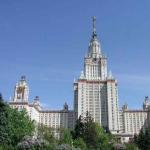Huge advantage humanities the fact that they contain a moral principle to a much greater extent than natural ones.
B.V. Rauschenbach
Humanities education
(from Latin humanitas - human nature) - special education in the field of social sciences.
Humanitarian universities in Moscow
In Russia at all times, the quality and standard of living of the population depended on spiritual development, level of culture and education. Culture was introduced into the people by people with a humanitarian education, which is the basis for the development of human culture. The fundamental task of modern humanitarian universities is to train highly qualified personnel ready for effective practical activities in order to develop the educational, cultural and socio-economic potential of the country.
The functions of humanitarian universities in the socio-economic sphere are multifaceted and, in addition to educational ones, they also represent other types of activities:
- scientific;
- educational;
- economic;
- sociocultural;
- innovative.
All major universities - Moscow State University, RUDN, MGIMO, etc. - have humanities faculties in their structure. Humanities faculties are available not only in universities and humanities universities, but also in economic institutes. And in technical universities In the first years, the humanities are required to be taught: history, philosophy, political science.
The wonderful thing about education is that no one can take it away from you.
B.B. King
Humanitarian education profiles among school graduates are in greater demand than technical and medical ones. Humanities universities, in addition to specialized disciplines, provide in-depth knowledge of history, sociology, literature, philosophy, and cultural studies. Such a solid foundation of classical liberal arts education provides the opportunity for successful development in a wide variety of fields.
Quite often, graduates of humanitarian universities successfully work in related fields. For example, philologists work not only as teachers of Russian language and literature, but also as editors, journalists, and copywriters. Graduates of the Faculty of History become analysts and experts in various consulting agencies. Professional philosophers do an excellent job as PR managers, translators, human rights activists, and teachers. Specialists in social sciences in demand in marketing and strategic planning departments large companies in different areas, since sociologists are well versed in the structure of society and the laws by which it functions and develops.
Basic typical educational programs humanitarian universities:
Humanities - philology, philosophy, history, jurisprudence, journalism, linguistics, publishing, documentation and archival science, physical education.
Social-psychological work - psychology, sociology, social work, organization of work with youth, political science.
The international cooperation - international relationships, foreign regional studies, translation and translation studies.
Culture and art - cultural studies, museology and protection of cultural and natural heritage sites, library and information activities, vocal art, conducting, musical and instrumental art.
A liberal arts education will develop a humanitarian mindset—the ability to simply explain complex things. It will be useful to you not only in building a career, but also in your personal life.
Despite the current higher popularity of economic and technical professions, humanists continue to remain not only in demand, but also necessary for Russian society.
TOP 10
Among more than 1500 Russian universities Humanities make up more than a third. It is quite difficult to select the top ten from them, due to the inevitable subjectivity of the selection principles. For this reason, the most accurate TOP 10 will most likely be a rating that is a combination of data from the most prestigious state (on the one hand) and objective non-state (on the other hand) competitions, studies and surveys.
Prestigious research includes such all-Russian annual federal competitions as “The Best University of Russia”, as well as the annually published opinion of the Expert agency under the priority national project “EDUCATION”, created with the support of the Ministry of Education and Science of the Russian Federation.
In this case, the TOP 10 as of 2017 will look like this:
- Moscow State University (not directly related to humanitarian universities, but with faculties of humanitarian orientation). Unconditionally No. 1 in Russia among all universities in general, confirming its rating by the presence in the TOP-200 “highest” in the world and requiring the maximum number of points in the Russian Federation for admission to leading specialties.
- MGIMO also does not require additional introductions for well-known reasons.
- RSUH (Russian State University for the Humanities - No. 1 among purely humanitarian universities in the list of experts, No. 4 in the list of voters on Internet sites and No. 26 in the overall ranking of Russian universities).
- SPbSU (St. Petersburg State University is the first non-Moscow university in the ranking to receive this place, not least for the number of humanities specialties offered - 40!).
- (the first non-state university in the ranking, the clear leader in Internet voting, almost twice as large as its nearest competitor).
- MNEPU (again with Moscow registration, International Ecological and Political Science Independent University).
- MGI (another Moscow humanitarian institute named after the famous Princess Ekaterina Dashkova, who served as President of the Russian Academy).
- Humanitarian St. Petersburg University of Trade Unions (SPbSUP).
- Moscow State University for the Humanities named after Sholokhov (MSGU).
Features of training 
Considering the presence of a huge range of humanitarian specialties, developed for each of them educational plans in the new Federal State Educational Standards, higher professional education differs significantly. However, this applies only to the third, professional training cycle. The peculiarity of training in humanitarian universities (in comparison with other technical and economic educational institutions) is the reduction in the number of training hours in the first, natural science cycle- in favor of the second, humanitarian and social.
The main disciplines of humanists will be history (domestic), philosophy, foreign language, management and marketing, and main goal- student training:
- understanding social structure society and the place of man in it;
- various religious and philosophical pictures of the world;
- interaction in personality of biological and social principles;
- diversity and complexity of historical processes;
- a foreign language (to the extent necessary to work with information in foreign sources);
- the political organization of states and societies, as well as the role of violence or its absence in them.
Quality of training
It is very difficult to talk about any average quality of education in humanities universities in the country as a whole. The reason for this is the huge gap between the level of teaching in leading educational institutions, which today remains very high, and regional universities, especially small ones - in which it is difficult to call it satisfactory. The decline in prestige of humanities specialists in “non-top” specialties and the unevenness of funding are also reflected here. And many other reasons. True, there is hope for an improvement in the situation - if the implementation of the federal program for raising the prestige of humanities education and its financial support are not cut in favor of any other areas.
The most popular specialties (bachelor's degree)
The most popular undergraduate majors in the humanities have not changed significantly over the past decades. The top five still includes:
- international relationships;
- political science;
- advertising;
- journalism;
- sociology.
Study prospects
They are, as before, traditional - and are associated, first of all, with the chosen specialty and future profession. Here is the opportunity to get a prestigious job abroad or in top domestic companies, and a secure future if you reach certain heights in political science, journalism or the advertising industry.
The huge advantage of the humanities is that they contain a moral principle to a much greater extent than the natural sciences.
B.V. Rauschenbach
Humanities education
(from Latin humanitas - human nature) - special education in the field of social sciences.
Humanitarian universities in Moscow
In Russia at all times, the quality and standard of living of the population depended on spiritual development, level of culture and education. Culture was introduced into the people by people with a humanitarian education, which is the basis for the development of human culture. The fundamental task of modern humanitarian universities is to train highly qualified personnel ready for effective practical activities in order to develop the educational, cultural and socio-economic potential of the country.
The functions of humanitarian universities in the socio-economic sphere are multifaceted and, in addition to educational ones, they also represent other types of activities:
- scientific;
- educational;
- economic;
- sociocultural;
- innovative.
All major universities - Moscow State University, RUDN, MGIMO, etc. - have humanities faculties in their structure. Humanities faculties are available not only in universities and humanities universities, but also in economic institutes. And in technical universities, humanities are required to be taught in the first years: history, philosophy, political science.
The wonderful thing about education is that no one can take it away from you.
B.B. King
Humanitarian education profiles among school graduates are in greater demand than technical and medical ones. Humanities universities, in addition to specialized disciplines, provide in-depth knowledge of history, sociology, literature, philosophy, and cultural studies. Such a solid foundation of classical liberal arts education provides the opportunity for successful development in a wide variety of fields.
Quite often, graduates of humanitarian universities successfully work in related fields. For example, philologists work not only as teachers of Russian language and literature, but also as editors, journalists, and copywriters. Graduates of the Faculty of History become analysts and experts in various consulting agencies. Professional philosophers do an excellent job as PR managers, translators, human rights activists, and teachers. Specialists in social sciences are in demand in the marketing and strategic planning departments of large companies in various fields, since sociologists are well versed in the structure of society and the laws by which it functions and develops.
Main standard educational programs of humanitarian universities:
Humanities - philology, philosophy, history, jurisprudence, journalism, linguistics, publishing, documentation and archival science, physical education.
Socio-psychological work - psychology, sociology, social work, organization of work with youth, political science.
International cooperation - international relations, foreign regional studies, translation and translation studies.
Culture and art - cultural studies, museology and protection of cultural and natural heritage sites, library and information activities, vocal art, conducting, musical and instrumental art.
A liberal arts education will develop a humanitarian mindset—the ability to simply explain complex things. It will be useful to you not only in building a career, but also in your personal life.




